- Home
- Jane Peart
Destiny's Bride Page 12
Destiny's Bride Read online
Page 12
Druscilla Montrose Bondurant
I ended my letter to Mama, then went to bathe and dress for dinner. In the six weeks we had been traveling, Randall and I had never been alone for a moment. Except for the stilted morning of our wedding ceremony in Rome, we either had the children with us or the servants or friends.
I felt a little nervous spending a dinner hour alone with him. What would we find to talk about? Would it be stiff and awkward and uncomfortable?
Well, we were married now, weren't we? I'd have to get used to that fact. I must remember all Auntie Kate's and Mama's training on poise, proper manners, and ladylike behavior, especially since my deportment had been one of the factors in Randall's proposal. I mustn't disappoint him!
I had not worn the lovely dinner gown from Worth's since my final fitting, so Randall had never seen me in it.
Now, as I took it out from its tissue wrappings, I drew a long breath. It was exquisite! Of pale blue grenadine, scalloped in peacock blue velvet, its overskirt was draped in back and fell in cascading ruffles into a short train.
After I had put it on and buttoned the dozen tiny covered buttons on the tightly fitted basque, I could not believe my own eyes. Who was that tall, elegant woman looking back at me in the mirror?
I felt a giggle bubble up inside and held my hand over my mouth as I preened in front of the looking glass, back and front, both sides, giving my train a little kick as I turned. Who would ever have dreamed that Dru Montrose of Mayfield, Virginia, would be dressed by Worth and dining in one of the most exclusive hotels in London?
My hair, still damp from my bath, went smoothly into a chignon. This simple style suited me so much better than the fussy ones in vogue.
Then I slipped in my sapphire-and-pearl earrings, picked up my fan and small evening bag, and went to meet my ... husband. The idea was still foreign to me. I hoped my appearance would please him.
He was waiting for me at the foot of the carpeted stairway of the lobby and escorted me into the dining room.
Everything was perfection—the soft music playing throughout the meal, the tables with their smooth white linen, fresh flowers in crystal vases, the rich, delicious food, superbly served.
Much to my surprise, for I had feared we would have nothing to say to each other without the children, our conversation went well. It was filled with observations about our travels, the sights, the people, the places and events we had experienced together, but with different impressions. We even laughed about some incidents that, in retrospect, seemed humorous to us now.
Our after-dinner coffee was served in tiny, eggshell-thin cups. Regretfully I realized this pleasant evening was drawing to a close. Over the rim of my cup I searched Randall's face, hoping to find a similar reluctance to leave, but his expression was unreadable.
Knowing I could delay no longer, I gathered my things and we left. To my surprise, as we passed the ballroom where an orchestra was playing and couples were dancing, Randall paused.
"Would you care to dance?" he asked.
"Yes, very much!" I replied, delighted.
He escorted me into the ballroom and there I moved into his arms as he swept me out onto the floor. So expert a dancer was he, that my feet barely touched the polished surface. We did not speak, simply followed the music, moving together easily as if we had danced together a hundred times before.
As the last strains of the music faded away, we stood only inches apart, our hands still touching. Randall regarded me in a way that both puzzled and stirred me. Then, bowing slightly, he stepped away, offered me his arm again, and we walked back into the lobby.
At the foot of the staircase Randall said good-night. I heard the orchestra striking up another melody and longed to return to that place where spoken words were not necessary.
With the sounds of the lilting music still in my ears, I mounted the stairs to my rooms, feeling the lingering enchantment of the evening. I had been happier in the last hours than I had for a very long time. The subtle tension of the last few weeks seemed to have melted away, and I felt hopeful that my position as Randall's wife might become more than a role I was playing.
Had this evening marked a new beginning, the start of a new relationship for Randall and me?
In two short days we would sail for America and on to Virginia where we would begin a new life together. Was it possible that the strange destiny that had brought us together promised happiness, after all?
chapter
17
I FOUND this trans-Atlantic crossing by ship much different from the one I had made a year before. The first time, as the girls' governess, my duties were clearly defined. One express duty had been to keep the children removed from the frantic, festival-like atmosphere of first class passengers, who considered a trip like this merely an excuse for a two-week party.
This time, Randall had arranged to have a stewardess employed by the steamship company to act as "nanny" to the girls during the trip. Consequently, traveling as Mrs. Bondurant, I would be accorded the untold privileges due Randall's wife.
Dressed in my stylish Worth ensemble with my taupe velvet Paris bonnet, I was led by an obsequious steward down through the carpeted corridors, followed by another, trundling my steamer trunk filled with my new clothes to my deckside cabin.
He opened the door for me, and I stepped into a luxurious room unlike the more compact one I had occupied during our first trip.
Without the constant charge of the children, I was introduced to the many pleasurable occupations afforded passengers on the ship, which was like a floating hotel or resort.
Without meaning to be vain, for I credit all this mainly to my new wardrobe and the fact that I was young, energetic and not at all seasick, I soon had gathered about myself a group of fellow passengers who seemed eager for my company.
I loved being out in the invigorating sea air and enjoyed games of deck tennis and shuffleboard. In the evenings there was always entertainment—theatricals and dancing— which I enjoyed enormously.
I was teased about my Southern accent, but since it was considered "charming," I was not at all disturbed. I loved playing charades and learning the folk dancing being taught. In fact, perhaps for the first time since I had visited the Merediths for that memorable Christmas holiday, I was able to be with people my own age and act accordingly.
Although he did not join in, Randall seemed tolerant of all my activities. Even though he spent his time playing bridge and reading in his deck chair, we did walk together twice daily, promenading the deck. And of course, we took our meals together at the table assigned to us.
He was always correctly courteous and solicitous of my welfare, but it was not until midway on our crossing that he introduced matters pertaining to the future.
One day—a day that was somewhat overcast with a brisk wind so that only the hardiest of sailors was out on deck—Randall spoke of our return to Virginia.
"I've been giving a great deal of thought to the house," he said. "It will be the house my daughters grow up in, the house they will be married in, I suppose, when that time comes. I want them to feel the tradition of a home that has passed from generation to generation."
I did not say so, but I thought to myself that Montclair had passed out of the family with Randall's acquisition. Then I remembered that by marrying me, the straight line of succession had been reestablished. After all, Alair had only been a second cousin, not truly a Montrose.
"So, I have been thinking it should be restored. The wallpaper wasn't the same in 1730 when the house was built, and the wainscoting was unpainted. Am I right?"
I shook my head. "I don't know."
"From the original plans and drawings I've seen, the whole house was done with a simple elegance that was lost somehow in redecorating." He paused, and I knew he was thinking of Alair. Her tastes, a reaction to her extreme poverty, leaned toward extravagance.
"I know all the old furnishings were taken up to the attic and stored there when the new things a
rrived. Perhaps you could speak to some of the older members of your family, find out from them how the rooms looked. I would like to recreate the original atmosphere of Bon Chance . . . er . . . Montclair," he said. "Do you think you could help me?"
"Oh, yes! I'd like that very much." I was happy that he had suggested the project. It was something we could do together, something that would be sure to draw us closer.
The rest of the voyage was a series of exciting, interesting experiences. Randall seemed to relax and even enjoy himself at some of the evening festivities. The children joined us for luncheon each day and were otherwise happily occupied with the activities planned for the children on board.
The world of shipboard life seemed a life apart from anything I had known, and for those ten days the world outside did not intrude. Even though I was looking forward to my reunion with Mama, I almost hated to see our voyage end.
On the last night at sea there was a gala ball. I wore my Paris gown, a fantasy of tulle, lace, and appliqued silk flowers outlined with seed pearls. My dance card was filled by gallant and complimentary partners, and then Randall came to claim me for the last dance after which we formed a giant circle, singing "Auld Lang Syne."
I felt a certain regret, for another carefree episode had come to an end.
In Richmond I got off the train to visit Mama for a few days, and Randall, Nora, and Lally went on to Mayfield.
It was then that the full impact of my marriage on the rest of the family was broken to me.
Mama put it as gently as possible. "I have to be truthful, Dru. Harmony and Clint are very upset about the marriage."
"Why, Mama? Did they think it was too soon for Randall to marry again? I should think they would be pleased that I am their grandchildren's stepmother. Who could love them more than I?"
Mama shook her head. "I don't think they've thought that far. You have to understand . . . Alair was their only, beloved child. They will never get over her death. They will go on mourning her for the rest of their lives and . . . I suppose . . . they expected Randall to do the same."
"But, life goes on, Mama. Those children need a mother, someone who loves and cares for them as dearly as their own mother would—" I protested.
Mama just looked at me sorrowfully. "That's just the way it is, Dru."
There was a moment of silence, then Mama placed her hand over mine. "Are you happy, Dru? Do you love him?"
I didn't reply right away. I wasn't sure I wanted Mama to know the unusual terms of our marriage. To Mama, love was the only thing that mattered—a love that could last a lifetime, a love that was stronger than death. She would never understand how I could have settled for anything less.
"Yes," I said quietly. But I failed to mention that it was a love that had never been expressed, a love that was not returned.
Only a handful of relatives called during the next few days, and then it was time to leave for Mayfield. From the train station I hired a hack to take me out to Bon Chance. As I passed Cameron Hall, I wondered how Auntie Kate and Aunt Garnet and Uncle Rod felt about my marriage to Bondurant. I supposed I would find out soon enough.
The carriage turned in at the gate and started up the long elm-lined drive. An unexpected shiver chilled me as if a menacing shadow had fallen, darkening the sunlit October afternoon.
The closer we got to the house, the more tense I became. It was a sensation in direct contrast to the peaceful view from the carriage window—the smooth lawn sweeping down to the river, the leaves of the trees turning golden, the garden brilliant with fall flowers. It was difficult to imagine that fear or sorrow or anger or any violence could penetrate this pastoral, sheltered place.
And yet I knew better. Montclair had a history of its own. It had known the sound of laughter and of weeping and had been touched as often by tragedy as by joy.
I thought of Alair, the beautiful, capricious child who had grown up into a charming, butterfly-woman and become mistress of Montclair before me. Did her death still linger hauntingly?
I had no time to dwell on sorrowful possibilities, for the carriage had come to a stop in front of the columned porch and Ben was coming down the steps to assist me with my luggage.
"Glad to see you back, miss—-'scuse me, I mean, Missus." he grinned and shook his head at his own slip.
"Where are the children, Ben?" I asked, anxious to see them even after this short separation.
"They's with Vinny. Think they plannin' some kind of welcome-home celebration," he replied chuckling.
I hurried up the steps and into the house. To my surprise, Randall was standing at the open door to the library as I walked into the hall.
He acknowledged my arrival with a brief nod, then beckoned to me. "Come in here, Druscilla, I want you to see the wedding present that was delivered today."
I followed as he held the door wider for me to pass through. Then, in a few quick strides, he crossed the room to a large, draped form and snatched away the covering cloth.
What I saw made me gasp.
"From my former in-laws, your aunt and uncle!" Randall announced, stepping aside.
There in my startled view, was a full-sized portrait of Alair—not the vibrant woman she had been in life, but deathly pale, seated forlornly on an open coffin and holding a wilted white rose at her breast.
chapter
18
WITHIN WEEKS of our return, it had become clear to me that the silver tray on the hall table reserved for calling cards left by the Mayfield gentry would remain empty, and the daily mail would bring no invitations. We were being snubbed by the entire county! Loyalty to Aunt Harmony and Uncle Clinton, I suspected, was behind it all.
At first I was deeply hurt, then I realized that Bondurant had never been received, even when he was married to my cousin. Perhaps that's why they had traveled so much, I mused. Such open rejection would have been humiliating to Alair.
I knew Randall was aware of it, too. Perhaps he had thought things would change once it was known he had married a Montrose, rightful heir to Montclair. But what cut him most was knowing he would never be invited to join the Hunt—the exclusive membership passed down from father to son, never open to an outsider, especially an outsider who had wrested an inheritance from one of their own.
I turned my attention to achieving the changes he wanted in the house. Gradually the rooms were redone, one by one, regaining their original lovely simplicity. The ornate furniture was carted away and the beautiful old pieces, restored and polished, took their places.
We never mentioned the bizarre portrait of Alair her parents had commissioned, then sent. Where it was stored or what Randall did with it, I never knew. I only remember the look on his face, in which anger and pain conflicted.
One morning when I came down to breakfast, I met Randall just coming in from his solitary early morning ride. He halted on his way to his own suite of rooms to change from his riding clothes and looked at me speculatively.
"Do you ride?" he asked brusquely.
"Not well," I admitted. "As children, we all used to scramble on the back of an old mare put out to pasture while she ambled about and grazed. Then, when I lived at Cameron Hall, Uncle Rod instructed me in the use of a lady's saddle. But when we moved to Richmond, we couldn't afford to keep a saddle horse—"
"Well, then, you must learn, and at once," Randall said firmly. "I'm getting ponies for the girls, and you can take lessons along with them. I'll speak to my head groom. He'll find a nice, gentle horse for you. One hour a day to begin with, then two and so on." He spoke with customary decisiveness. "Perhaps by next fall, you'll be ready to hunt. I mean to have my own hunting parties, invite friends. We don't need the Mayfield Hunt Club!" His contempt was visible in the way he slapped his crop against his thigh and marched down the hall to his rooms.
I wasn't at all sure I liked the idea. Of course, Uncle Rod had belonged to the Club. In fact, the hunt always started from Cameron Hall. But the riders were all experts, a bit wild and reckless, I though
t, leaping and cantering and thundering by, jumping impossible fences, and tearing along the countryside.
But if it were so important to Randall—
Only a few afternoons later, Vinny brought two huge boxes to my bedroom. When I opened the first one, I found a handsome new riding habit—long fitted jacket and skirt of fine broadcloth in forest green, and a velvet bowler. Another box contained a pair of smooth leather boots. I slipped the jacket on. It fit perfectly. Then I tried on the hat, smoothing back my hair under the attached netting. Viewing myself in the full-length pier mirror, I felt a surge of satisfaction.
No wonder so many ladies rode, if one could look so elegant while doing so!
Lally and Nora were wildly excited over the ponies—a chestnut and a cinnamon-colored one—which Jed, the groom, led around to the front of the house on the first morning of riding instructions. Following him was a stable boy leading a beautiful gray mare, saddled and ready to be mounted.
"This is 'Missy,' ma'am," Jed introduced me. "She's a sweet, easy-goin' lady," he told me after he had lifted the little girls into their saddles. "She'll make a fine horse for you, Miz Bondurant. Nothin' for you to worry 'bout."
With both children already seated on their mounts and observing me curiously, there was no escape. Reminding myself that all the Montrose women had been splendid riders and that I had to keep up the tradition, I lifted my skirt, stepped onto the mounting block, threw my right leg over the pommel, and found myself in the saddle. It felt very high off the ground.
Jed patted Missy's neck and said soothingly, "Now, jest settle back and relax. We're gonna walk down to the corral, slow and easy."
Soon much of what Uncle Rod had tried to teach me came back—the proper way to hold the reins, to let the horse know what you expected, the proper posture. I began to enjoy the daily lessons and, little by little, gained confidence.
The girls were born horsewomen, and soon Jed had them jumping low fences.
One morning when I came into the dining room dressed in my riding habit, Randall was standing by the fireplace, sipping a cup of coffee. His eyes moved over me approvingly.

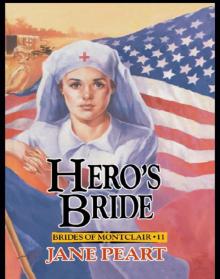 Hero's Bride
Hero's Bride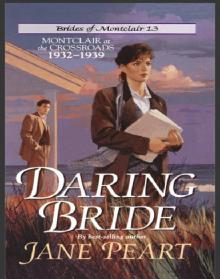 Daring Bride
Daring Bride Runaway Heart
Runaway Heart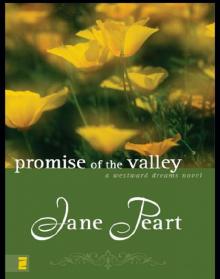 Promise of the Valley
Promise of the Valley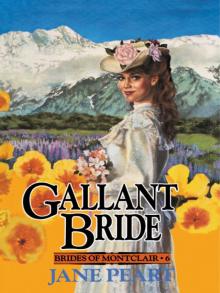 Gallant Bride
Gallant Bride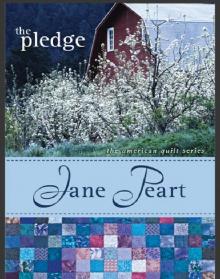 The Pledge, Value
The Pledge, Value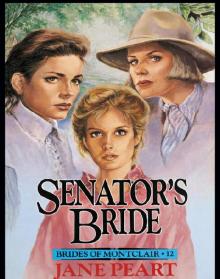 Senator's Bride
Senator's Bride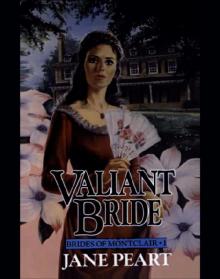 Valiant Bride
Valiant Bride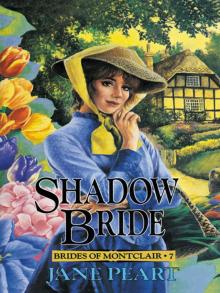 Shadow Bride
Shadow Bride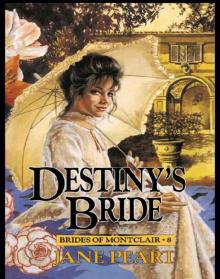 Destiny's Bride
Destiny's Bride A Tangled Web
A Tangled Web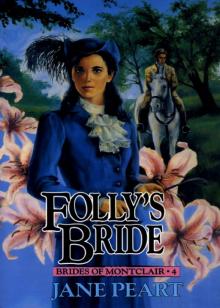 Folly's Bride
Folly's Bride The Promise
The Promise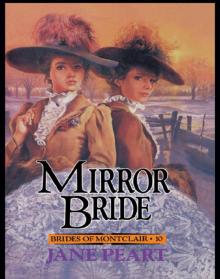 Mirror Bride
Mirror Bride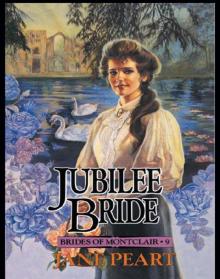 Jubilee Bride
Jubilee Bride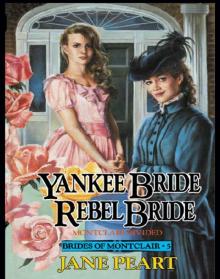 Yankee Bride / Rebel Bride
Yankee Bride / Rebel Bride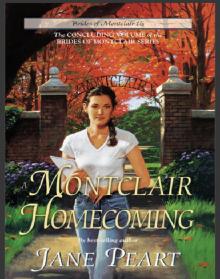 A Montclair Homecoming
A Montclair Homecoming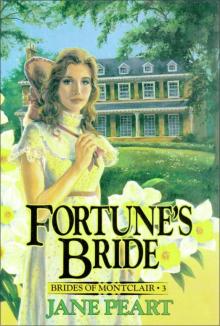 Fortune's Bride
Fortune's Bride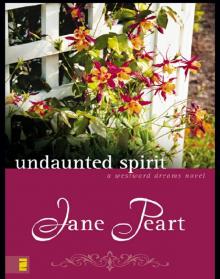 Undaunted Spirit
Undaunted Spirit Love Takes Flight
Love Takes Flight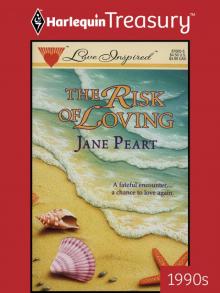 The Risk of Loving
The Risk of Loving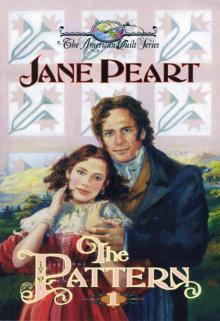 The Pattern
The Pattern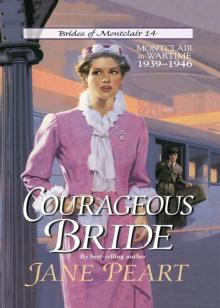 Courageous Bride
Courageous Bride